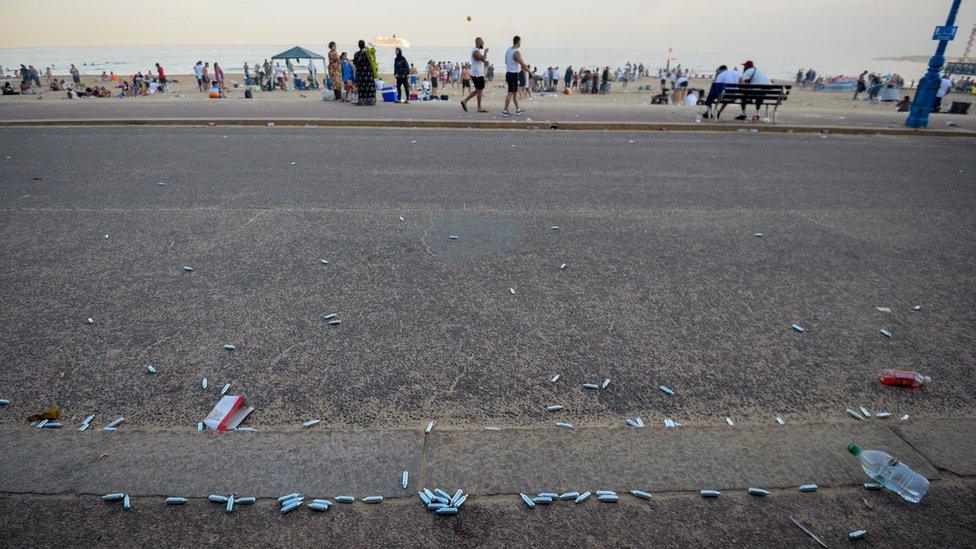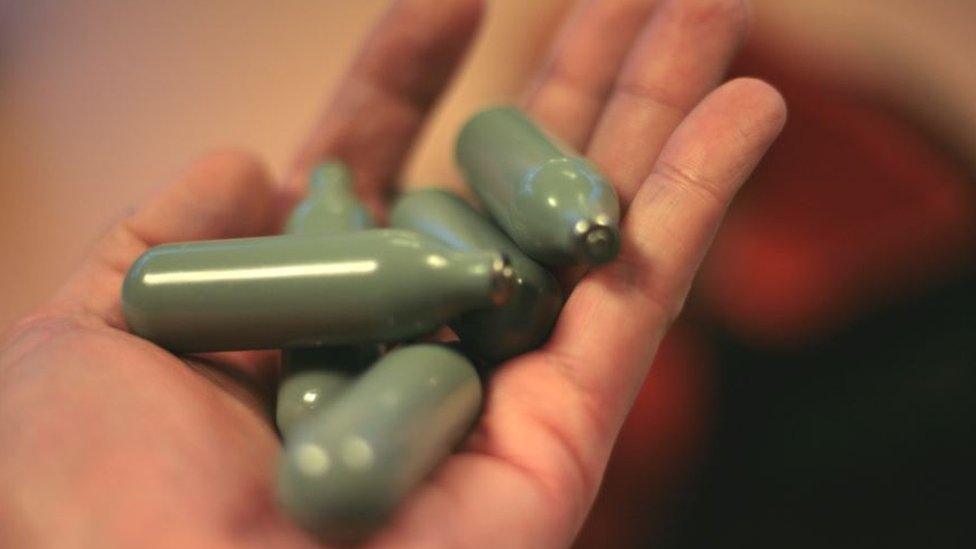Nitrous oxide: MP wants to see tightening of laughing gas laws
- Published
Nitrous oxide is sold in metal canisters often discarded in the street
A Labour MP has called for ministers to tighten the regulations on the sale of nitrous oxide.
Rosie Duffield also suggested better education about the risks of the substance, also known as laughing gas.
And she told MPs that recreational use has become "much more prevalent" during the coronavirus outbreak.
Home Office Minister Kevin Foster said the government was conscious of the concerns about nitrous oxide misuse and said some sellers had been shut down.
In a debate in the Commons, Ms Duffield said: "Teenagers tell me that boxes sell for as little as £5 locally or I could just walk into one of the 25% of corner shops estimated to sell these chargers.
"If I purchased some canisters for the purpose of indulging a quick lockdown high, I wouldn't have broken the law.
"It is far too easy to be able to purchase nitrous oxide for use as a recreational drug and everyday, up and down the country, thousands of young people are doing just that.
"It is clear to me, and many of the experts that I've spoken to, that the recreational use has become much more prevalent during lockdown."
Sold legally, nitrous oxide is used for medical and commercial uses, such as making whipped cream - but is illegal when sold as a psychoactive drug.
When inhaled, the gas can cause elation and hallucinations.
In some cases, it can lead to a lack of oxygen, causing unconsciousness or suffocation.
The discarded silver canisters that the gas comes in have become a familiar sight underfoot in many parks and streets.
Ms Duffield said she wanted the parliamentary debate to "start a national conversation" about the harms associated with nitrous oxide, including toddlers finding the canisters, dangerous driving, and health problems such as numbness and psychosis.
Responding to Ms Duffield in the debate, Home Office Minister Kevin Foster said the sale of nitrous oxide for its psychoactive effects is already illegal and sellers have been shut down.
He encouraged online retails to be careful about who they are selling to, and said the upcoming white paper on online harms will address this issue specifically.
Funding for 6,000 new police officers is being made available, Mr Foster said, and these officers will be able to help combat drug use. Anyone caught littering can be charged or fined by councils, he said.
Mr Foster acknowledged that combating drug use cannot just be a question of law enforcement and must involve education.
It is unlikely that Ms Duffield's debate will lead to a change in the law.
As an adjournment debate, it simply allows backbench MPs to raise a matter in parliament but without a vote.

What are the risks?
Niamh Eastwood, from drug charity Release, says it has not seen an increase in reported use, either from official or self-reporting surveys, and that political concern about the drug is driven by media coverage.
Ms Eastwood says any move to tighten the law would be counter-productive. Due to the demographics of those who use nitrous oxide, such a move would "end up criminalising children and young people".
Official Home Office survey data, external from 2019 found that "levels of use of nitrous oxide have not changed in the most recent survey year" and nitrous oxide remains the second most commonly used drug among 16 to 24-year-olds, after cannabis.
Ms Eastwood argues that, although there are risks associated with heavy use, laughing gas is one of the safest psychoactive substances, and worried that if its use is criminalised "we could see young people move onto much more harmful substances."
"Criminalising doesn't reduce drug use," she adds.
She says it would be more helpful to run a campaign on how to use the gas safely.
And if the issue is litter, she says: "We might as well have an anti-litter campaign."

Discarded nitrous oxide cartridges litter the beach promenade in Bournemouth
'Max' - who did not want to use his real name - is 25 and from Cambridgeshire, and says he does not think laughing gas is becoming more popular.
Instead, he says, lockdown has made its use more visible because young people have been meeting in parks rather than homes or clubs.
He says he has used nitrous oxide for a few years.
It is "definitely a social thing" he says, something he uses at the weekends when with friends to "feel at ease and feel good".
Max believes the drug is safe, and says it is not addictive.
He thinks it is a "good thing" that nitrous oxide use is not illegal, because criminalising it would just force users out of sight.
He believes that the current legal status of the substance allows young people to talk about how to use the drug safely.
But Max is wrong to think the drug is safe, according to Prof Gino Martini, chief scientist at the Royal Pharmaceutical Society.
Speaking to the BBC's Victoria Derbyshire, Prof Martini warns that heavy use of nitrous oxide can lead to an erosion of the spinal cord, resulting in numbness or paralysis.
The very short nature of the "high" people feel is part of the problem, he explains, because it "encourages" repeated use of the drug.
"The issue is that people don't think it's harmful," he says.
Figures released by the Office for National Statistics, external show that 25 people died from nitrous oxide-related deaths in the six years between 2010 and 2016.

- Published15 November 2019

- Published6 March 2020
